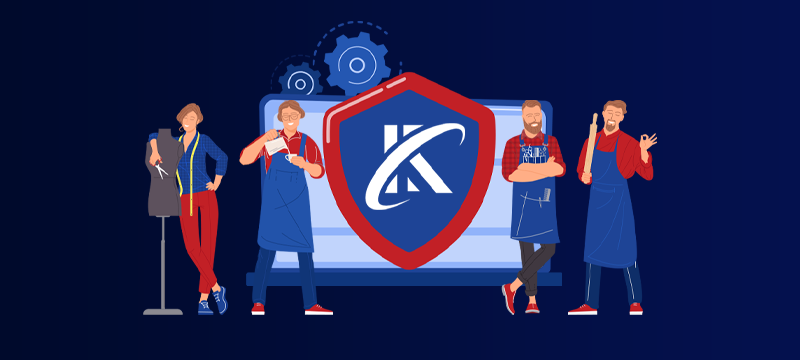Cyberattacks have become an unfortunate reality for businesses of all sizes. While large companies often have dedicated resources to combat cyber threats, sole traders can lack the same level of protection. However, protecting your website from cyberattacks is crucial, regardless of your business’s size. In this post, we discuss six essential cybersecurity measures that sole traders should implement to defend their websites and minimise the risk of potential breaches.
- Use strong passwords
The first line of defence against cyberattacks is to use strong passwords for your website, hosting account and email accounts. By using complex passwords that include a combination of uppercase and lowercase letters, numbers and special characters, you minimise the risk that attackers armed with advanced brute force cracking tools can gain access to your login credentials.For even greater security, implement multi-factor authentication (MFA) to add an extra layer of protection. MFA requires you to provide an additional form of identification, such as a code sent to your mobile phone, in addition to your password. This way, unless a hacker has your mobile phone with them, they won’t be able to access your accounts even if they have your username and password. - Keep software up to date
Outdated software, themes and plugins can contain security flaws that cybercriminals can easily exploit to gain access to your website. To protect against this, it is vital that you keep all your software up to date. Unfortunately, this is an ongoing and very regular requirement as developers are constantly releasing updates to patch security vulnerabilities. As a result, lots of website owners fail to keep pace with updates, leaving their sites at risk. The easy way to avoid this is to set up auto-updates so that your website updates automatically.If you use WordPress, you can configure the WordPress core software to update automatically in your admin dashboard. There are also various methods you can use to auto-update themes and plugins, for example, via some control panels, by using the Jetpack plugin or by using tools like Patchman. - Secure your website with SSL
Installing an SSL (Secure Sockets Layer) certificate is vital for securing sensitive information transmitted between your website and users’ browsers, such as payment details or information inputted onto forms. SSL encrypts data and adds an extra layer of protection against unauthorised access.Importantly, SSL certificates also help to establish trust with your website visitors. Without an SSL, your website is labelled as ‘not secure’ by browsers, potentially putting off customers from using the site or buying from it. With an SSL, your site is given the secure padlock icon on the browser’s address bar.Depending on your business needs, you can either install a free SSL, like Let’s Encrypt, or if you need greater levels of verification and warranty, you can opt for an advanced SSL. - Back Up Your Website
If a cybercriminal did gain access to your website, they could infect it with malware, encrypt it with ransomware or even delete the entire site. If any of these things happened, you may need to rebuild your entire website. Without a backup, this could be a long and expensive process that could do considerable damage to your company’s online visibility, reputation and sales.It is, therefore, essential that you back up your website regularly. With a backup, you can restore your site and get back on with your day-to-day business quickly, without the cost and effort of rebuilding the site from scratch.The easiest way to do this is to opt for an automated backup solution that does the hard work for you and stores your website backup securely and remotely, should you ever need it. Indeed, at Webhosting UK, many of our hosting plans come with free daily backups included. If you need to back up more frequently than that, there are more advanced website and server backup solutions you can opt for. - Use a Web Application Firewall (WAF)
A Web Application Firewall is a powerful security tool that acts as a shield between your website and potential threats. It filters out malicious traffic, such as hacking and malware attacks, before they reach your website.At Webhosting UK, many of our hosting solutions come with advanced WAF protection included, keeping your site secure from threats. For those that require even more advanced firewall security, there is the option of using tools like Imunify360 – which is designed to provide robust protection for Linux servers and websites that are hosted on them - Monitor website traffic
Using a website analytics tool can provide valuable insights into your website’s traffic patterns and potential security threats. This will let you monitor your website to identify any suspicious activities or abnormal traffic patterns. For example, unusual spikes in traffic or unexpected requests, especially if from the same IP address, could indicate a potential attack. Taking swift action, like blocking an IP address, can help mitigate any damage.
Conclusion
As a sole trader, it can be challenging to maintain your website security while focusing on running your business. However, with so many cyberattacks taking place, it is vital to do so. Hopefully, the six measures mentioned in the post will show you not only how to keep your website protected, but how to do it in a way that will not impact on your time or your budget.
Looking for fast reliable and affordable web hosting that comes with robust security built in? Check out our Shared Hosting with cPanel plans.

